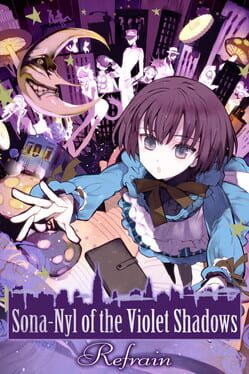I was first introduced to the writing of Hikaru Sakurai via Fate/Grand Order. In that fandom, at least in the west, she's seen as something of a pariah--a very poor writer who can't rein in her otome tendencies and writes bad deus ex machina plots. I've never really agreed with that criticism, I think her arcs in that game are mostly fine if strangled a bit by early-game weirdness or being forced to do Main Plot Stuff and not asmuch use her voice. I've always wondered what her writing was like outside the context of Type-Moon.
Which leads me to Sona-Nyl. Although not the first game of hers to be translated into english, it was the one I was pointed to as being "actually good". And, well, it was!
The thing that stood out to me was the quality of the prose. Even through translation, it is immediately and clearly apparent that the writing from the moment you start Sona-Nyl comes from a different, more literary place than most of its contemporaries. It's use of rhythm and repetition, short but flowery description, and fuzzy emotions are all just really beautiful and help elevate the material throughout the game.
Like, the structure of the story means that in each chapter of the game there is a lot of repeated narration passages--like, literally word for word repeated 6+ times. In the hands of weaker writers, this would have been miserable and an obvious way to kill the pacing of the game, but here just by how the script is and how the narrative unfolds, I ended up relishing each time they'd repeat the passages and it gives them so much more meaning as you learn more of the world.
Of course, all the beautiful writing in the world wouldn't matter if the core narrative wasn't good, which is also the case here--the twin stories of Elysia exploring the ruins of New York while Lily explores the fantasy underground entwine in a way that gives the story a strong structure that both leans into the story's message and the greater meaning of the series.
Like, there's a clockwork-like precision to the narrative and prose that tie together that really make this work feel steampunk not just in setting, but in the actual words as well. It's something I've really never seen executed here and makes it a better steampunk work than most anything else I've read. But there's an inhumanity to it just as much, a certain unease that comes across that also pushes absurd ethereal world the characters live in. Its just...beautiful.
I don't really know what else to add. It's a very different take on this sort of science-fantasy than you'll find anywhere else in the visual novel field, let alone outside of it. It instantly sold me on reading as much of Sakurai's works as possible, and I wholeheartedly recommend it.
Which leads me to Sona-Nyl. Although not the first game of hers to be translated into english, it was the one I was pointed to as being "actually good". And, well, it was!
The thing that stood out to me was the quality of the prose. Even through translation, it is immediately and clearly apparent that the writing from the moment you start Sona-Nyl comes from a different, more literary place than most of its contemporaries. It's use of rhythm and repetition, short but flowery description, and fuzzy emotions are all just really beautiful and help elevate the material throughout the game.
Like, the structure of the story means that in each chapter of the game there is a lot of repeated narration passages--like, literally word for word repeated 6+ times. In the hands of weaker writers, this would have been miserable and an obvious way to kill the pacing of the game, but here just by how the script is and how the narrative unfolds, I ended up relishing each time they'd repeat the passages and it gives them so much more meaning as you learn more of the world.
Of course, all the beautiful writing in the world wouldn't matter if the core narrative wasn't good, which is also the case here--the twin stories of Elysia exploring the ruins of New York while Lily explores the fantasy underground entwine in a way that gives the story a strong structure that both leans into the story's message and the greater meaning of the series.
Like, there's a clockwork-like precision to the narrative and prose that tie together that really make this work feel steampunk not just in setting, but in the actual words as well. It's something I've really never seen executed here and makes it a better steampunk work than most anything else I've read. But there's an inhumanity to it just as much, a certain unease that comes across that also pushes absurd ethereal world the characters live in. Its just...beautiful.
I don't really know what else to add. It's a very different take on this sort of science-fantasy than you'll find anywhere else in the visual novel field, let alone outside of it. It instantly sold me on reading as much of Sakurai's works as possible, and I wholeheartedly recommend it.
